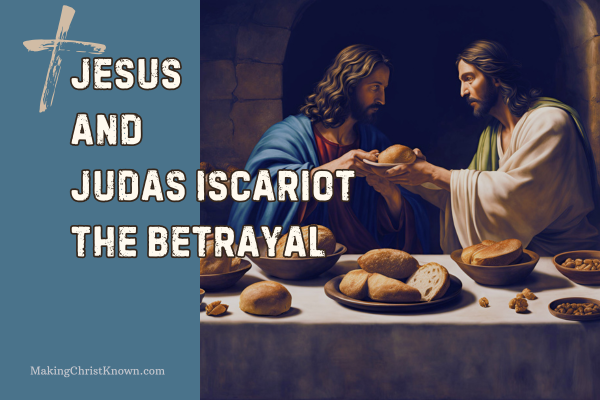Jesus and Judas Iscariot: The Betrayal of Jesus
Matthew 26:20-25 brings us to a pivotal moment in the Easter story: the Last Supper. It’s a scene many recognize today as communion, especially in Southern churches, but it’s also where Jesus reveals a heartbreaking truth—one of His own disciples, Judas Iscariot, would betray Him.
As we read this passage, we’ll find the deep significance of Jesus’ sacrifice. The Last Supper was not only a meal but a powerful lesson in love, grace, and the weight of betrayal. Learn how this act of deception shaped the path to the cross.
Jesus Points Out Judas Iscariot At Last Supper
Now when evening came, Jesus was reclining at the table with the twelve disciples.
As they were eating, He said, “Truly I say to you that one of you will betray Me.”
Being deeply grieved, they each one began to say to Him, “Surely not I, Lord?”
And He answered, “He who dipped his hand with Me in the bowl is the one who will betray Me.
The Son of Man is to go, just as it is written of Him; but woe to that man by whom the Son of Man is betrayed! It would have been good for that man if he had not been born.”
And Judas, who was betraying Him, said, “Surely it is not I, Rabbi?” Jesus said to him, “You have said it yourself.” – Matthew 26:20-25 NASB
Easter Story: Jesus, Judas, and Betrayal
“You have said it yourself,” Jesus replied to Judas. This profound statement during the Last Supper reveals the defining moment in the Easter story—a moment of betrayal, grace, and divine purpose.
A Quick Note on Passover Timing
The exact date of the Passover meal, now known as the Last Supper, remains a mystery. Depending on whether a solar or lunar calendar was used, Passover may have fallen on a Wednesday, placing this sacred meal on a Tuesday evening.
Jesus Knew Judas Would Betray Him
How did Jesus know Judas would betray Him? The answer is simple yet profound: God knows everything. From the beginning, Jesus was fully aware of Judas’s intentions. Yet, He still broke bread with him, offering love and grace even in the face of betrayal.
The Tradition of Dipping for Bread
During the meal, Jesus and His disciples followed the custom of dipping bread into a shared bowl. When Jesus announced that one among them would betray Him, He wasn’t singling anyone out—yet. Only when it was Judas’s turn to dip did the truth become clear.
Reflecting on Our Own Betrayal
Before we cast judgment on Judas, it’s important to reflect: Do we ever betray Christ? When we sin, we fall short of His expectations. However, unlike Judas, we are offered forgiveness through grace.
- We try our best but will never achieve perfection.
- We are saved not because of what we do, but because of who God is.
The Remarkable Grace of God
This Easter story isn’t just about betrayal; it’s about redemption. God’s grace covers even our worst moments. When we ask for forgiveness, He wipes our slate clean, reminding us that His love is greater than our shortcomings.
Take time this Easter to reflect on the Last Supper, the betrayal of Jesus by Judas, and the incredible gift of grace available to all who seek it. Isn’t God’s grace remarkable?
Love in Christ
– Bob
If you would like to find how to receive the love and life-changing experience of Jesus Christ, please take a moment to look at John 3:16 to learn more.
Discover more from Making Christ Known
Subscribe to get the latest posts sent to your email.
